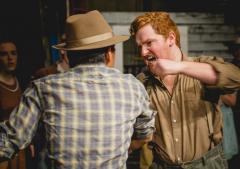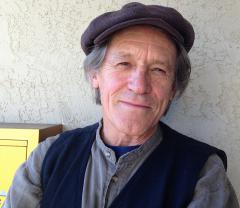|
|
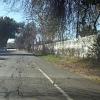 The city of Davis, facing a $5 million yearly deficit and a backlog of deferred road repairs (this photo, shot through a windshield, shows Olive Drive), has asked voters to boost the city sales tax by a half-cent per dollar starting this fall. Citywide votes on water rates and possibly a new city parcel tax are also in the works this year. On today’s show, Davis Vanguard blogger David Greenwald--who has written extensively about the city's finances--talks about how the city dug this hole for itself, the options, and where we go from here. The city of Davis, facing a $5 million yearly deficit and a backlog of deferred road repairs (this photo, shot through a windshield, shows Olive Drive), has asked voters to boost the city sales tax by a half-cent per dollar starting this fall. Citywide votes on water rates and possibly a new city parcel tax are also in the works this year. On today’s show, Davis Vanguard blogger David Greenwald--who has written extensively about the city's finances--talks about how the city dug this hole for itself, the options, and where we go from here.
|
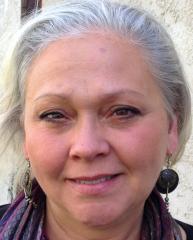 Debra DeAngelo, managing editor of The Winters Express, also writes the often-feisty "Because I Say So" opinion column that appears every Sunday in the Davis Enterprise. Today we talk about the column, her work, misperceptions that Davis and Winters have about each other, and more.
Debra DeAngelo, managing editor of The Winters Express, also writes the often-feisty "Because I Say So" opinion column that appears every Sunday in the Davis Enterprise. Today we talk about the column, her work, misperceptions that Davis and Winters have about each other, and more.
|
 A customer who doesn't want to smell bacon. Product questions. Criticism of music played in the store. The Suggestion Box at the Davis Food Co-op, one of Davis’ iconic businesses, fields 80 contacts a month as part of one of the most basic transactions at any business: Dealing with the public. In this case, the Davis public. On today’s Davisville we talk with Membership Director Doug Walter about keeping the customer happy, plus related subjects concerning the Co-op, expectations for choice, and more.
A customer who doesn't want to smell bacon. Product questions. Criticism of music played in the store. The Suggestion Box at the Davis Food Co-op, one of Davis’ iconic businesses, fields 80 contacts a month as part of one of the most basic transactions at any business: Dealing with the public. In this case, the Davis public. On today’s Davisville we talk with Membership Director Doug Walter about keeping the customer happy, plus related subjects concerning the Co-op, expectations for choice, and more.
|
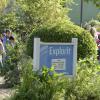 Explorit Science Center, founded in Davis 32 years ago to be "a place [where] people could find out how science is part of our everyday lives," nearly had to close this winter for lack of money. In today’s program, Lars Anderson—Explorit’s board president and interim executive director—talks about how they plan to recover. Explorit Science Center, founded in Davis 32 years ago to be "a place [where] people could find out how science is part of our everyday lives," nearly had to close this winter for lack of money. In today’s program, Lars Anderson—Explorit’s board president and interim executive director—talks about how they plan to recover.
|
|
|
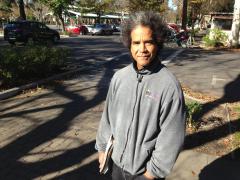 In summer 2009, David Breaux began standing at 3rd and C to ask passers-by to define compassion, and to write their definition in his notebook. As 2013 ends he’s still at it, having collected 10,000 definitions, about a third of which have been gathered into a book. A bench, built at the corner with donated money, material and effort, honors his vigil. David first appeared on Davisville in June 1010; today he talks about what he has learned, and the Compassion Tour that might take him out of town for a year starting in summer 2014. But he says he’d come back.
In summer 2009, David Breaux began standing at 3rd and C to ask passers-by to define compassion, and to write their definition in his notebook. As 2013 ends he’s still at it, having collected 10,000 definitions, about a third of which have been gathered into a book. A bench, built at the corner with donated money, material and effort, honors his vigil. David first appeared on Davisville in June 1010; today he talks about what he has learned, and the Compassion Tour that might take him out of town for a year starting in summer 2014. But he says he’d come back.
|
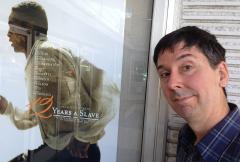 Derrick Bang writes reviews for the Davis Enterprise and his blog, Derrick Bang on Film. On today’s show, an autumn tradition on Davisville, he discusses the year-end films, the movie hits and misses of 2013, the passing of Roger Ebert, and even a little about holiday jazz. You see him here next to a poster at the Varsity for “12 Years a Slave”—the first movie of 2013 to earn one of his rare 5-star reviews.
Derrick Bang writes reviews for the Davis Enterprise and his blog, Derrick Bang on Film. On today’s show, an autumn tradition on Davisville, he discusses the year-end films, the movie hits and misses of 2013, the passing of Roger Ebert, and even a little about holiday jazz. You see him here next to a poster at the Varsity for “12 Years a Slave”—the first movie of 2013 to earn one of his rare 5-star reviews.
|
 With the Cannery housing development coming up for a decision, now’s a good time to take stock of the Davis housing market—including trends this year in sales and prices, the outlook for 2014, who’s buying, and the effect of adding the Cannery’s proposed 547 homes to the local supply. We discuss this and more with returning guest Steve Boschken, a Davis mortgage and real estate broker who also has a degree in environmental design and urban planning from UC Davis.
With the Cannery housing development coming up for a decision, now’s a good time to take stock of the Davis housing market—including trends this year in sales and prices, the outlook for 2014, who’s buying, and the effect of adding the Cannery’s proposed 547 homes to the local supply. We discuss this and more with returning guest Steve Boschken, a Davis mortgage and real estate broker who also has a degree in environmental design and urban planning from UC Davis.
|
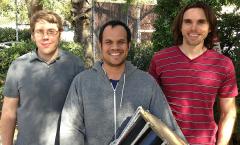 Davis Makerspace, sort of a cross between a workshop and a public library, and open to science and tech as well as to art, opened in a converted storage unit in a downtown alley this year. So how does the budding nonprofit work, why is it here, who’s it for, and what does it offer to Davis? We get answers today in a talk with three of its members/directors – Nicholas Weigand (far left), Jeff Tolentino (holding a drum he made at makerspace), and Braden Pellett.
Davis Makerspace, sort of a cross between a workshop and a public library, and open to science and tech as well as to art, opened in a converted storage unit in a downtown alley this year. So how does the budding nonprofit work, why is it here, who’s it for, and what does it offer to Davis? We get answers today in a talk with three of its members/directors – Nicholas Weigand (far left), Jeff Tolentino (holding a drum he made at makerspace), and Braden Pellett.
|

